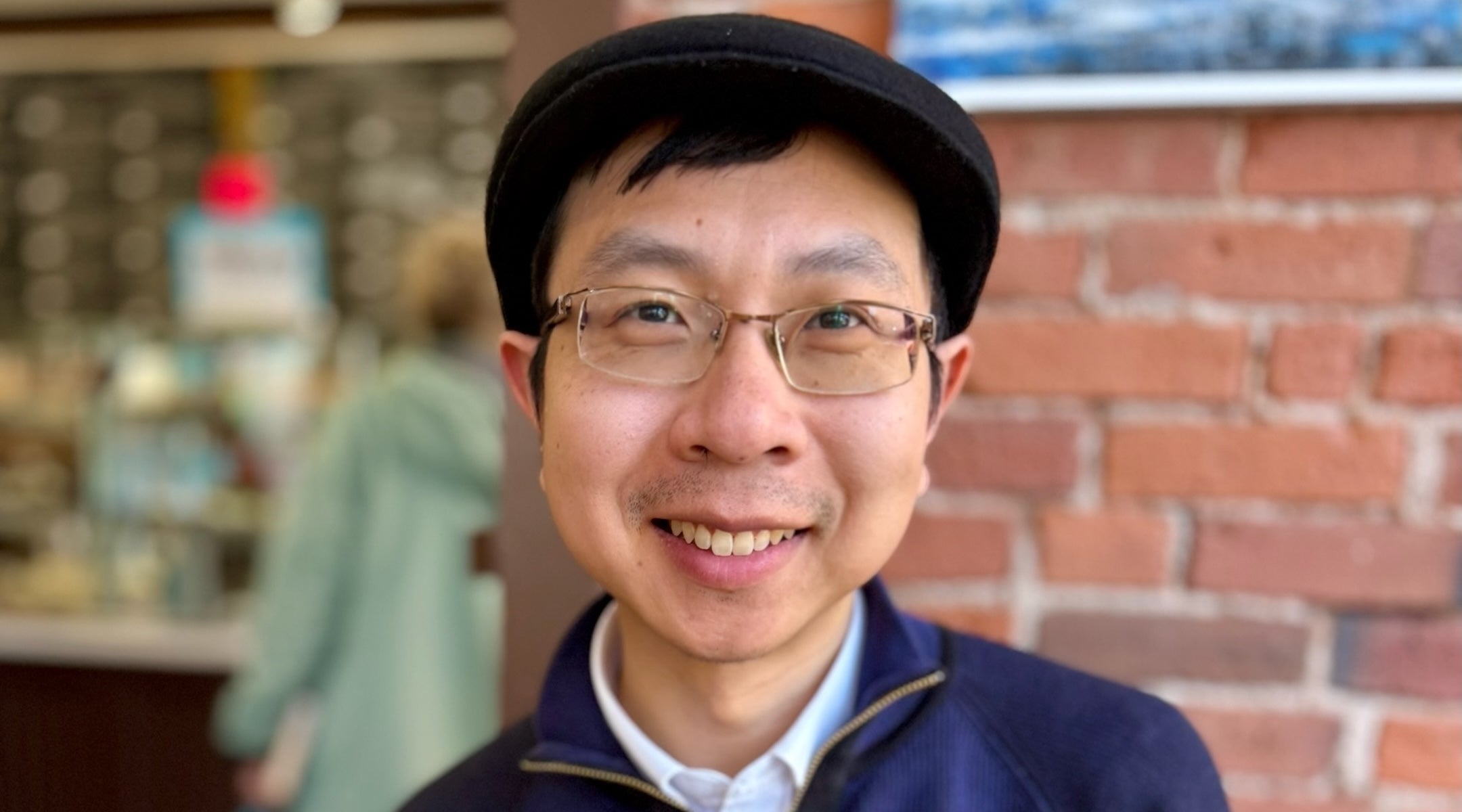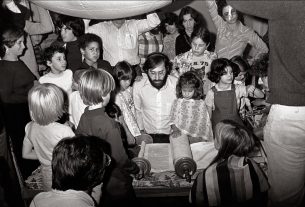When Liangda Hu first tried doing Daf Yomi, the practice of studying a page of Talmud per day, he struggled to read it. Hu found the language of English Talmud translations uniquely archaic and, as someone who speaks English as a second language, difficult to understand.
So he turned to artificial intelligence.
Now, Hu uses ChatGPT to translate his daily Talmud study into his native Mandarin. “I think it’s quite reliable when it comes to translation,” he said.
The technology is not perfect, Hu pointed out. To be safe, he often cross-references ChatGPT’s answers when asking about customs, like how to prepare for a particular fast day. But overall, Hu said, “Using AI has really sped me up for Talmud and Torah learning.”
AI is not the first technology to help Hu along his journey from his hometown in China toward becoming a Jew in his adopted home of Brownstone Brooklyn, where the 38-year-old immigrant has gone by the name Leo. Along the way, a broadcast of “Fiddler on the Roof” and a Facebook connection with his first Jewish friend played pivotal roles.
But ChatGPT, which just relaunched last week with an even more powerful model, is perhaps changing the frontiers of Jewish life even more quickly than the technology innovations that preceded it.
“AI provides a lot of new entry ways into Torah that didn’t exist before,” said David Zvi Kalman, host of “Belief in the Future,” a podcast about technology and religion. “AI allows for all kinds of translations that are not priorities for mainstream translators — like obscure texts, or translations between languages that are less common.”
Hu had no idea as a child in Tianjin, China, that he would ever be engaging with a Jewish language, or becoming one of the first — if not the first — daily Talmud students to work from a machine translation into Mandarin. Growing up just a decade removed from the Cultural Revolution, during which religion was essentially banned, would have made a future as a Jew in New York City feel like a farfetched possibility — if he could even have imagined it.
But that was before Hu saw “Fiddler on the Roof.”
“It was quite fascinating,” said Hu, who today lives in Prospect Heights while pursuing an MBA at Monroe College. He first watched the Academy Award-winning musical — a staple of the Ashkenazi Jewish cultural canon — while studying acting at a theater school in China.
“What deeply fascinates me is how this family finds balance between tradition and an ever-changing reality,” Hu said, adding that he was also moved by “the way that Tevye expresses his relationship with God.”
The musical had a profound effect on Hu, who moved to New York in 2021 to attend a musical theater program at the Manhattan School of Music. Now, he is pursuing two simultaneous goals: to run his own theater company, and to officially convert to Judaism.
In coming to New York, Hu left behind a country in which Jews constitute just 0.0002% of the population, and where connections to Judaism can be few and far between.
Tianjin happens to have a notable Jewish history: The city’s Jewish population peaked at around 3,500 in 1935, amid waves of immigration by Jews escaping Russian pogroms and, later, the Nazis.
When passage opened after the war, virtually all of those migrants left, and today, “there is no longer a Jewish community in Tianjin,” Hu said. The city’s Art Deco synagogue, built in 1939, has since been turned into a restaurant.
But for Hu, “Fiddler on the Roof” was something of a gateway to an increasingly Jewish life.
Raised in a non-religious family by atheist parents, Hu had long been interested in the idea of a higher being. He began practicing as a Catholic at one point — Hu said he enjoyed feeling “guidance” in his daily life from Catholicism, at a time when there was “no chance [for him] to really get in touch with Judaism” — but said he felt “a bit of distance from Catholicism.”
Before moving to New York, Hu had done some reading about Jewish customs and culture. After the move, he was surrounded by it.
The first friend he made in New York happened to be a Jewish man he’d met on Facebook. When his friend’s father died, Hu joined him to sit shiva. “It was such a profound experience,” he said. Despite not understanding the words of the Hebrew and Aramaic prayers, Hu said the experience “felt so warm.”
Today, Hu is a regular attendee of Prospect Heights Shul, a Modern Orthodox synagogue in Brooklyn. He is learning to cook traditional Jewish dishes — last week’s cholent turned out “not bad,” he said — and has begun altering certain favorite Chinese recipes in order to make them kosher, like swapping out dried shrimp for dried anchovies.
Hu said that every Friday night, he finds himself thinking about the Shabbat scene from “Fiddler on the Roof,” in which one home after another lights their candles. “That sudden shift in atmosphere — from busyness to warmth — is something I experience every Shabbat,” Hu said.
Prospect Heights Shul’s head rabbi, Jonathan Leener, is overseeing Hu’s Modern Orthodox conversion, which is expected to be complete next spring.
“He’s just a staple,” Leener said of his student. “I take pride that I’m the first person into shul on Shabbat morning. And now I have to compete with him because he beats me there often — which is a signal that he’s a convert, because he doesn’t understand Jewish time,” he joked. (A bonus of having a musical theater background: Leener added that Hu has a “beautiful voice,” according to those who sit near him.)
Like the hundreds of converts Leener has worked with since he started doing conversions in 2016, Hu has been attending sessions with the rabbi every other Monday evening, as well as additional, in-depth classes on practical elements like lighting Shabbat candles, doing havdalah, saying kiddush and making one’s kitchen kosher.
Hu said he’s noticed similarities between Talmud and Chinese canonical works, like the Sayings of Confucius: “It’s not, ‘This is what you should do, this is what you should do.’ It’s, ‘This is a debate, actually, and also a record of those sages.’”
His interactions with both Chinese and Jewish culture inspired him to write a full-length play last year, titled “Two Mr. Mas in New York,” about a Chinese father and son who immigrate to the United States, and rent an apartment from their Jewish downstairs neighbors.
It’s a story that embodies Hu’s own journey — and offers a note of relief to Kalman, who says the “chief limitation” of studying Torah using AI is the risk of losing the communal aspect of Jewish life.
“Torah study isn’t just about the knowledge itself. A lot of Talmud is pretty disconnected from the modern world. So if you’re just reading it for information, you’re not going to get so much,” Kalman said. “It’s often the experience of learning it in community that makes it valuable.”
Jewish stories matter, and so does your support.




